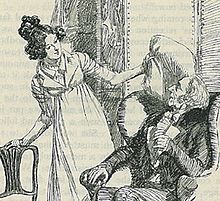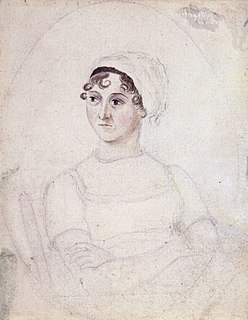
Jane Austen was an English novelist known primarily for her six major novels, which interpret, critique, and comment upon the British landed gentry at the end of the 18th century. Austen's plots often explore the dependence of women on marriage in the pursuit of favourable social standing and economic security. Her works critique the novels of sensibility of the second half of the 18th century and are part of the transition to 19th-century literary realism. Her use of biting irony, along with her realism and social commentary, have earned her acclaim among critics and scholars.
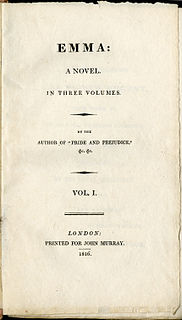
Emma is a novel about youthful hubris and romantic misunderstandings, written by Jane Austen. It is set in the fictional country village of Highbury and the surrounding estates of Hartfield, Randalls and Donwell Abbey, and involves the relationships among people from a small number of families. The novel was first published in December 1815, with its title page listing a publication date of 1816. As in her other novels, Austen explores the concerns and difficulties of genteel women living in Georgian–Regency England. Emma is a comedy of manners.
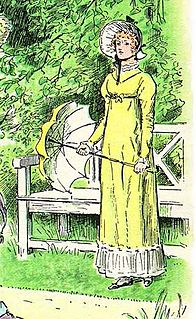
Elizabeth Bennet is the protagonist in the 1813 novel Pride and Prejudice by Jane Austen. She is often referred to as Eliza or Lizzy by her friends and family. Elizabeth is the second child in a family of five daughters. Though the circumstances of the time and environment push her to seek a marriage of convenience for economic security, Elizabeth wishes to marry for love.

Emma is a 1996 period comedy film based on the 1815 novel of the same name by Jane Austen. Written and directed by Douglas McGrath, the film stars Gwyneth Paltrow, Alan Cumming, Toni Collette, Ewan McGregor, and Jeremy Northam.

Jane Austen's Emma is an adaptation of the 1815 novel of the same name. It was adapted for the British television network ITV in 1996, directed by Diarmuid Lawrence and dramatised by Andrew Davies, the same year as Miramax's film adaptation of Emma starring Gwyneth Paltrow. This production of Emma stars Kate Beckinsale as the title character, and also features Samantha Morton as Harriet Smith and Mark Strong as Mr. Knightley.
Ronald George Blythe is an English writer, essayist and editor, best known for his work Akenfield (1969), an account of agricultural life in Suffolk from the turn of the century to the 1960s. He wrote a long-running and considerably praised weekly column in the Church Times entitled "Word from Wormingford".

The reception history of Jane Austen follows a path from modest fame to wild popularity. Jane Austen (1775–1817), the author of such works as Pride and Prejudice (1813) and Emma (1815), has become one of the best-known and most widely read novelists in the English language. Her novels are the subject of intense scholarly study and the centre of a diverse fan culture.

Anne Elliot is the protagonist of Jane Austen's sixth and last completed novel, Persuasion (1817).

George Knightley is a principal character depicted by Jane Austen in her novel Emma, published in 1815. He is a landowner and gentleman farmer, though "having little spare money". A lifetime friend of Emma's, though nearly seventeen years older than she, he enjoys correcting her.

Emma Woodhouse is the 21-year-old protagonist of Jane Austen's 1815 novel Emma. She is described in the novel's opening sentence as "handsome, clever, and rich, with a comfortable home and a happy disposition... and had lived nearly twenty-one years in the world with very little to distress or vex her." Jane Austen, while writing the novel, called Emma, "a heroine whom no-one but myself will much like."
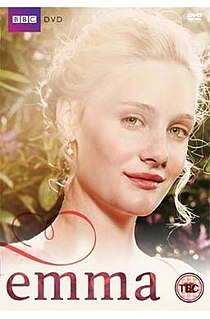
Emma is a four-part BBC television drama serial adaptation of Jane Austen's 1815 novel Emma. The episodes were written by Sandy Welch, writer of previous BBC costume dramas Jane Eyre and North & South, and directed by Jim O'Hanlon. The serial stars Romola Garai as the titular heroine Emma Woodhouse, Jonny Lee Miller as her loyal lifelong friend Mr. Knightley, and Michael Gambon as Emma's father, Mr. Woodhouse. The serial originally ran weekly on Sunday nights on BBC One from 4 to 25 October 2009.

Jane Austen's (1775–1817) distinctive literary style relies on a combination of parody, burlesque, irony, free indirect speech and a degree of realism. She uses parody and burlesque for comic effect and to critique the portrayal of women in 18th-century sentimental and Gothic novels. Austen extends her critique by highlighting social hypocrisy through irony; she often creates an ironic tone through free indirect speech in which the thoughts and words of the characters mix with the voice of the narrator. The degree to which critics believe Austen's characters have psychological depth informs their views regarding her realism. While some scholars argue that Austen falls into a tradition of realism because of her finely executed portrayal of individual characters and her emphasis on "the everyday", others contend that her characters lack a depth of feeling compared with earlier works, and that this, combined with Austen's polemical tone, places her outside the realist tradition.
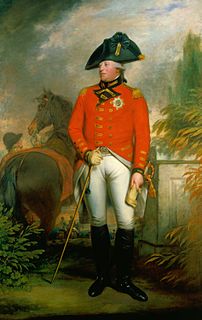
Georgian society in Jane Austen's novels is the ever-present background of her work, the world in which all her characters are set. Entirely situated during the reign of George III, the novels of Jane Austen describe their everyday lives, their joys, and sorrows, as well as their loves, and provide in the process an irreplaceable insight into the period.
Colonel Brandon is a fictional character in Jane Austen's 1811 novel Sense and Sensibility. A quiet and reserved man, he forms an attachment to the middle Dashwood sister, Marianne.
Henry Tilney is the leading man in Jane Austen's 1817 novel Northanger Abbey. The younger son of a local landowner, Tilney is comfortably placed as a beneficed clergyman on his father's estate.

George Wickham is a fictional character created by Jane Austen who appears in her 1813 novel Pride and Prejudice. George Wickham is introduced as a militia officer who has a shared history with Mr. Darcy. Wickham's charming demeanour and his story of being badly treated by Darcy attracts the sympathy of the heroine, Elizabeth Bennet, to the point that she is warned by her aunt not to fall in love and marry him. It is revealed through the course of the story that George Wickham's true nature is that of a manipulative unprincipled layabout, a ne'er-do-well wastrel, compulsive liar and a degenerate, compulsive gambler, a seducer and a libertine, living the lifestyle of a rake. Lacking the finances to pay for his lifestyle, he gambles regularly and cons credit from tradesmen and shopkeepers and skips out on paying-up.
Mr. Weston is a supporting character in Jane Austen's novel Emma, written in 1815. He marries the governess of the heroine, Emma Woodhouse, and it is the arrival of his son, Frank Churchill, in Highbury that sets the events of the plot in motion.
Miss Bates is a supporting character in Jane Austen's 1815 novel Emma. Genteel but poor, and a compulsive talker, she is memorably insulted on one occasion by the book's heroine, to the latter's almost immediate remorse.
Anna Austen Lefroy (1793-1872) was the niece of Jane Austen by her eldest brother James Austen, and a contributor to her life-history via the so-called Lefroy MS.
Richard Jenkyns is Professor of the Classical Tradition at Oxford University and an historian and literary critic who has written widely on Classical and other matters.
